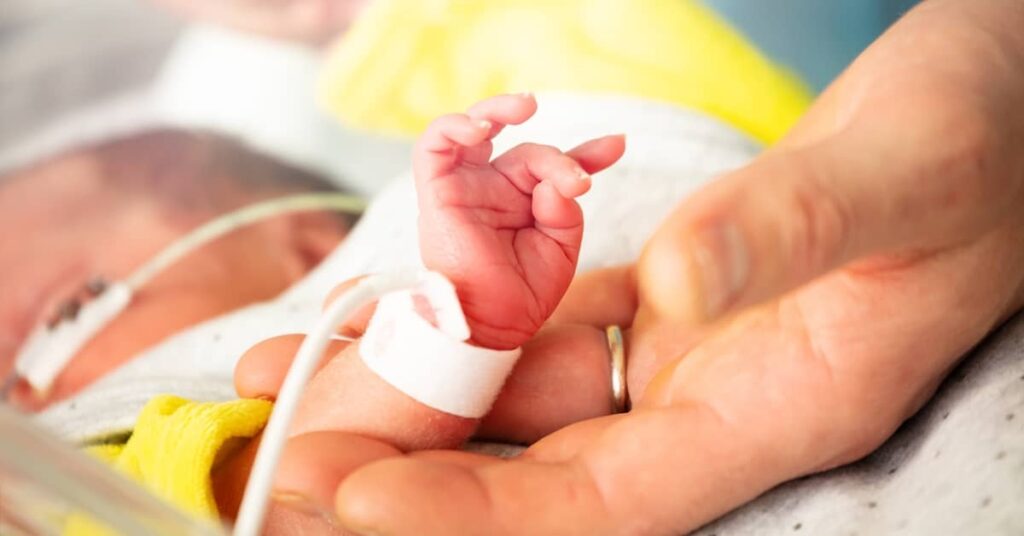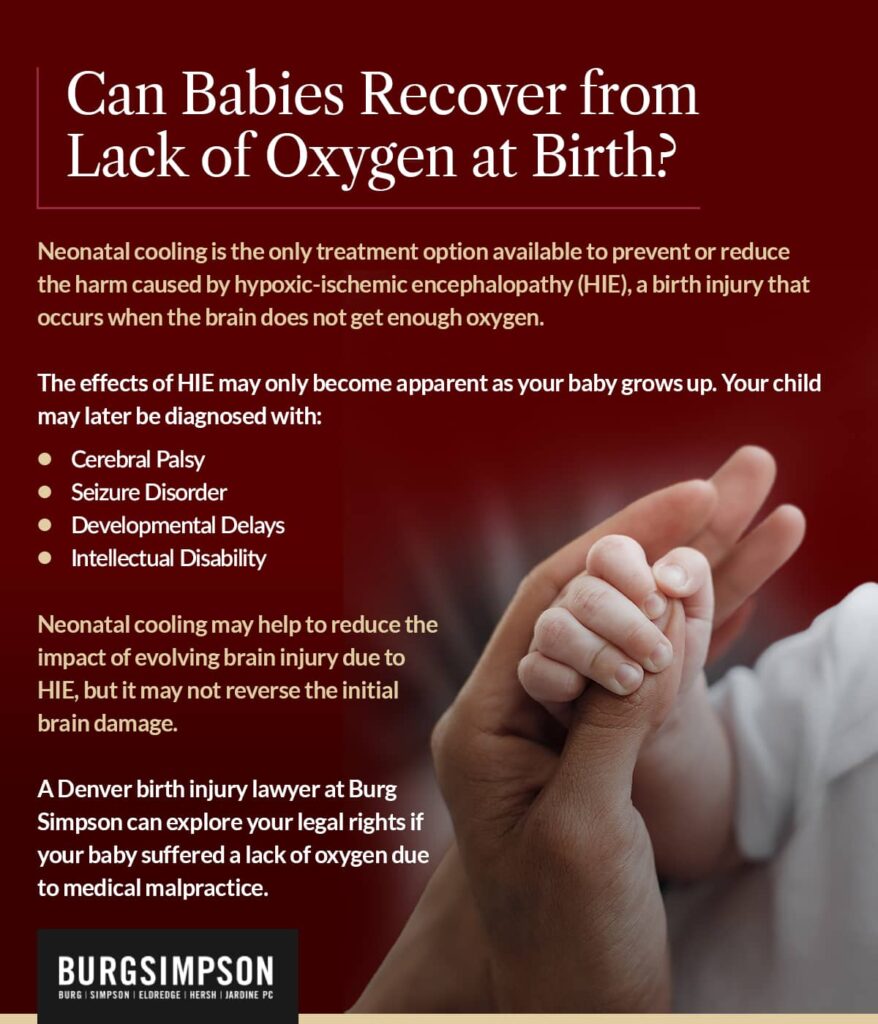
Is Neonatal Cooling a Sign of Medical Malpractice?
Hypoxic-ischemic encephalopathy (HIE) is a type of birth injury that occurs when the brain does not get enough oxygen prior to birth or during labor and delivery. Worldwide, approximately 1–3 babies suffer HIE for every 1,000 births.
Neonatal cooling (also known as head cooling, whole body cooling or therapeutic hypothermia) is the only treatment option available today to prevent or reduce the harm caused by hypoxic-ischemic encephalopathy. Timely intervention is critical for minimizing brain damage due to oxygen deprivation.
Parents often have unanswered questions when a newborn baby requires neonatal cooling or other significant medical treatment after birth. One of the biggest questions is whether an error on the part of medical professionals caused a serious injury like HIE. A Denver birth injury lawyer at Burg Simpson can explore your legal rights.
Call 303-792-5595 today for a FREE and confidential case evaluation. Our birth injury lawyers serve clients in Denver and all of Colorado.
What Is Neonatal Cooling?
During neonatal cooling, the baby’s internal body temperature is safely and gradually lowered. Neonatal cooling may be performed at the hospital where your baby was born, or your baby may need to be transferred to a cooling center with the equipment and specialized staff needed to manage HIE.
Whole body cooling is generally performed for three days, during which the internal temperature is reduced to 92℉. This slows down metabolic processes, which has been found to prevent additional brain damage stemming from hypoxic-ischemic encephalopathy.
Once the cooling therapy is complete, the baby is slowly warmed back up until their body temperature is normal. From start to finish, the entire process takes about a week. Unfortunately, the effects of HIE may only become apparent as your baby grows up.

Why Did My Baby Need Neonatal Cooling?
Parents do not always get a complete explanation when their baby is diagnosed with hypoxic-ischemic encephalopathy. All they know is that something is very wrong. Instead of getting to hold their newborn, the baby is taken away and hooked up to machines.
The doctor may have told you that neonatal cooling was the only option to save your baby’s life. What they may have left out is that HIE is, in many cases, a preventable injury.
HIE often occurs because medical personnel fail to monitor the baby during labor and delivery. Undetected fetal distress and failure to take necessary measures may lead to birth asphyxia and subsequent brain damage.
There are many potential complications associated with hypoxic-ischemic encephalopathy. A child who requires neonatal cooling after birth may later be diagnosed with:
- Cerebral Palsy: Cerebral palsy (or CP) refers to several different conditions marked by difficulties with mobility, muscle control, and posture. The different types of CP are:
- Spastic cerebral palsy: The most common type of cerebral palsy, spastic CP is characterized by overly stiff muscles and exaggerated movements.
- Athetoid/dyskinetic cerebral palsy: With athetoid or dyskinetic CP, muscle tone varies from stiff and inflexible (hypertonia) to loose and floppy (hypotonia). This can lead to a range of uncontrollable motions and movements.
- Hypotonic/atonic cerebral palsy: Muscle tone is low with hypotonic CP, resulting in muscle weakness and unstable balance.
- Ataxic cerebral palsy: People with ataxic CP experience ataxia, or a lack of muscle control that can affect the ability to walk, fine motor skills, eye movement, and speech.
- Mixed cerebral palsy: If multiple parts of the brain are damaged, children may exhibit signs of more than one type of CP. This is known as mixed cerebral palsy.
- Seizure disorder: Children who suffer hypoxic-ischemic encephalopathy are five times more likely to develop epilepsy. Epilepsy is characterized by recurring, unprovoked seizures.
- Developmental delays: Children who experienced HIE at birth may take longer to reach developmental milestones, such as delays in holding up their head, reaching for objects, crawling, standing, walking, talking, etc.
- Intellectual disability: HIE may result in difficulties with learning how to read, pay attention in school, retain information, and more. Children with intellectual disabilities may also exhibit behavioral problems, such as difficulty interacting with other children and acting out in social situations.
Neonatal cooling may help to reduce the impact of evolving brain injury due to HIE, but it may not reverse the initial brain damage. That is why the circumstances that lead to a birth injury need to be closely examined by knowledgeable professionals.
If your child underwent whole body cooling as a newborn and is later diagnosed with a condition associated with hypoxic-ischemic encephalopathy, this may be a sign of medical malpractice in the delivery room.
Why Choose Burg Simpson for a Birth Injury Claim?
Attorneys at Burg Simpson have an in-depth understanding of birth injuries. We diligently collect evidence and work closely with highly credentialed medical experts to identify what caused the child’s injury. If doctor or hospital negligence was a factor, we can pursue legal action on your behalf.
Birth injuries like hypoxic-ischemic encephalopathy can lead to significant medical expenses for the family. It can also result in a number of physical, emotional, and financial hardships for the child—both now and in the future.
Contact Burg Simpson for FREE Today
Do not face the aftermath of a birth injury on your own. Burg Simpson has local clout and national strength, enabling us to hold negligent doctors and hospitals accountable and obtain fair compensation for families.
Get answers to your questions and the support and legal insights you need. Contact Burg Simpson today for a FREE consultation with an experienced Denver birth injury lawyer.





